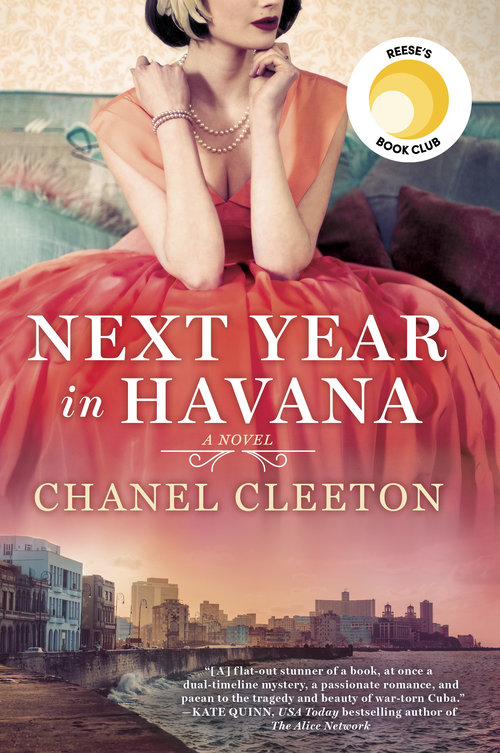As a descendant of Cuban exiles, with advanced degrees in international relations and global politics, author Chanel Cleeton is more than qualified to write this historical novel. The title is taken from the forever wish of Cuban exiles to return home. The story is told in alternating chapters during two time periods. In 1958 Havana, the rebels continue to fight and eventually defeat Batista, bringing Fidel Castro to power. Present day Cuba has been tentatively reconnected to the U.S. by President Obama's new policies. One narrator is Elisa Perez, 3rd daughter of a wealthy sugar baron close to Batista's regime. She is 19 and has led a sheltered, high society life that has been little inconvenienced by--and is probably not even aware of--the rising power of a hungry and oppressed populace, even though her brother, the only Perez son, has been cast out by their father for his revolutionary views. One night, she and her 2 older sisters sneak out to a party where she meets a compelling older man, Pablo, who turns out to be an idealistic Castro supporter. Her family would be shamed by her relationship to him, but she is hopelessly in love and eventually becomes pregnant. Before she can inform him about the pregnancy, he disappears into the mountains to join the fight against Batista, and Elisa is later told that he has been killed. When the body of Elisa's brother, fraternal twin to Elisa's sister Beatriz, is dumped at the gates of the family mansion, they knows they must flee with only their lives and none of their possessions. They make a new home in Palm Beach and Elisa is quickly married to avoid the shame of an unwed pregnancy. Our second narrator is Marisol, the granddaughter of Elisa. Elisa had stepped in to raise Marisol and her siblings after their mother abandoned the family. Elisa filled Marisol's head and heart with romantic stories of the life she left behind in Cuba, and upon her death asks only that Marisol return her ashes to Havana. This provides the jumping off point for the present day story line as freelance lifestyle writer Marisol brings Elisa's ashes home to Cuba and also seeks to learn more about her family's history. When Ana, Elisa's best friend who remained in Cuba, gives Marisol a box of letter from Pablo that Elisa buried before she escaped, Marisol is even more determined to find out about the man her grandmother loved. But even though Castro is dead, the government will still not tolerate anyone stirring up trouble and Marisol creates problems as well by falling in love with Ana's grandson, who is hiding potentially deadly secrets of his own. I really enjoyed reading this book because I had recently visited Havana for a couple of days and felt it filled in a lot of the backstory to what I saw. Although Kirkus took the author to task for trying to weave together politics with romance, I was fascinated to learn more about paladars and the significance of the dual Cuban currency. Nothing is black or white. Castro was viewed as a redeemer, but turned out to be a tyrant. The Communist government promised to take care of everyone, yet people starved under his regime. The U.S. presence in Cuba was malign as was their support of the corrupt and cruel Batista. Author Chanel Cleeton draws on her family's own exodus history to write this and follows up with a sequel, When We Left Cuba, focused on Elisa's sister, Beatriz, who was fraternal twin to the murdered Perez son. I will definitely read it! You can read an excerpt from Next Year at NPR.

1 comment:
Hello everyone..Welcome to my free masterclass strategy where i teach experience and inexperience traders the secret behind a successful trade.And how to be profitable in trading I will also teach you how to make a profit of $12,000 USD weekly and how to get back all your lost funds feel free to email me on(brucedavid004@gmail.com) or whataspp number is +22999290178
Post a Comment